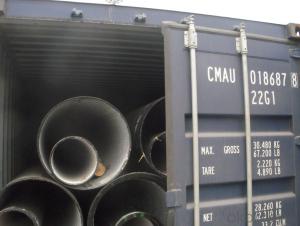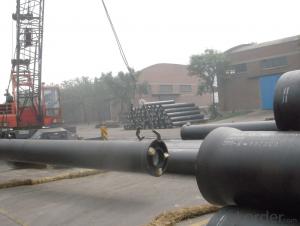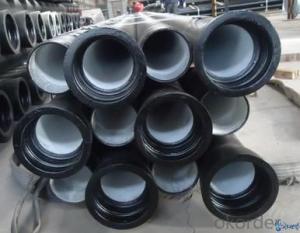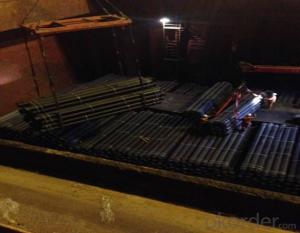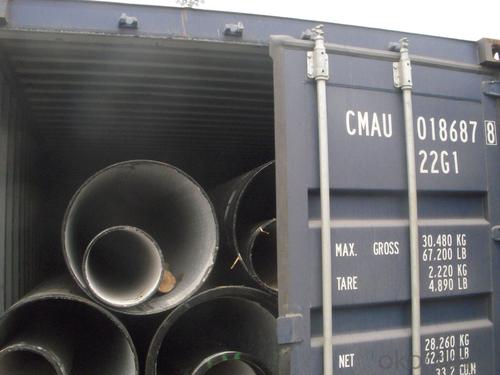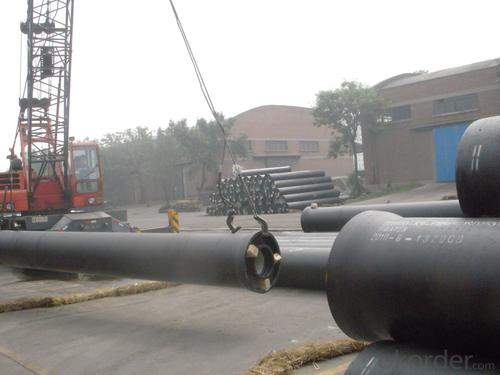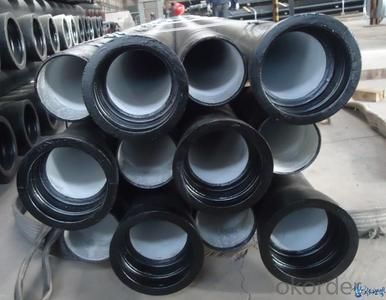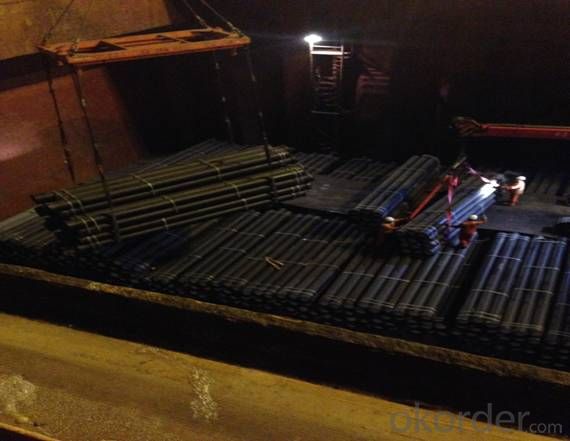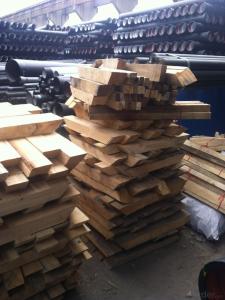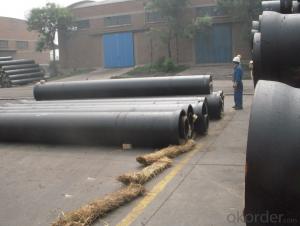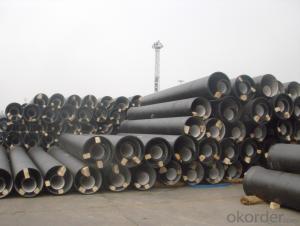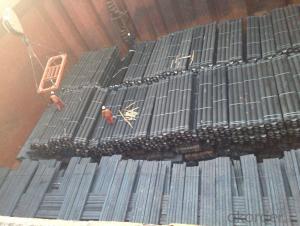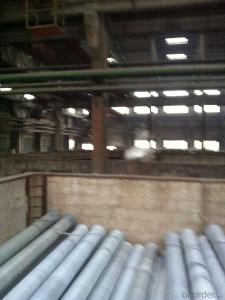DUCTILE IRON PIPES K9 DN100
- Loading Port:
- China Main Port
- Payment Terms:
- TT OR LC
- Min Order Qty:
- -
- Supply Capability:
- -
OKorder Service Pledge
OKorder Financial Service
You Might Also Like
Ductile Iron Cast Pipe is without any defects compare with tradition casting tech, which has many advantages particularly as follow:
(1) High density. In the "vertical upward casting" process, the melt iron of centre liquid column in center crystallizer is continuously feeding for volume shrinkage caused by condensation tube at outer circumference , which lead to be free of shrinkage porosity.
(2) High purity. When melt iron pouring, the mixed impurities such as gas, dross, sand grain which are lighter than melt iron could be eliminated at furnace mouth, its impossible to enter into the crystallizer through the channel, so the melt iron into the crystallizer is very pure.
(3) Strength with toughness. The cooling speed provided by continuous crystallizer is 30 times than sand casting and 5 times than centrifugal casting, and doesn't produce white iron, the eutectic cell volume of continuous cast iron is one eighth to one tenth compare with traditional cast iron. The density of graphite nodule in ductile iron can reach 300-700 pcs/mm2. Therefore, all reason above improve the strength and toughness of continuous cast iron.
(4) Free machining. The high speed cooling make the hardening phase (such as boride, steadite) not appear like reticular, massive or thick, but diffuse like fish bone and pane in shape, moreover, there are tiny graphite flakes inlaid hardening phase. It's free machining in BrinellHardness the range of 250-300HB. However, the Brinell Hardness of 250 is top limit to common metal materials.
(5) Uniform composition of tube wall. The convection mixing of liquid column caused by marching type drawing in crystallizer make the composition of tube wall well-distributed, and concentration gradient very little.
(6) High productivity. To the wall thickness of tube under 10mm, the speed of continuous casting is 1 meter/min, to the wall thickness of tube under 20mm, the speed of continuous casting is 0.5 meter/min, which is high efficiency that centrifugal or other casting tech couldn't reach.
- Q: Are ductile iron pipes suitable for landfill leachate collection?
- Yes, ductile iron pipes are suitable for landfill leachate collection. Ductile iron pipes have excellent corrosion resistance, which is crucial for handling landfill leachate that can contain various corrosive substances. These pipes also have high strength and durability, allowing them to withstand the pressure and stress of the leachate collection system. Furthermore, ductile iron pipes are known for their ease of installation and maintenance, making them a practical choice for landfill leachate collection systems. Overall, ductile iron pipes offer the necessary properties and characteristics to effectively and efficiently collect landfill leachate.
- Q: Are ductile iron pipes resistant to hydrostatic pressure?
- Ductile iron pipes exhibit resistance to hydrostatic pressure. These pipes are a variant of cast iron that is renowned for its robustness and longevity. Its mechanical attributes, including exceptional tensile strength and elasticity, empower it to endure significant levels of hydrostatic pressure. Consequently, ductile iron pipes are an optimal choice for tasks where pressurized water or other fluids must be conveyed, such as in water distribution systems, sewer lines, and industrial pipelines. Furthermore, these pipes possess a formidable resistance to corrosion, bolstering their capacity to withstand hydrostatic pressure and guaranteeing their enduring effectiveness and dependability.
- Q: What is the expected leakage rate for ductile iron pipes?
- The expected leakage rate for ductile iron pipes can differ depending on various factors like the pipes' age, condition, and installation approaches, as well as the quality of materials employed. Nevertheless, ductile iron pipes generally have a reputation for being durable and having low leakage rates compared to other pipe materials. Based on industry standards and research studies, well-maintained ductile iron pipes are expected to have a leakage rate as low as 0.1% per year. This implies that, on average, less than 1 liter of water may leak per meter of pipe length annually. However, it is important to note that this is an average value and actual leakage rates can vary. Regular maintenance and inspections are crucial in minimizing leaks and ensuring the longevity of ductile iron pipes. Additionally, proper installation techniques, such as using effective jointing methods and appropriate bedding and backfill materials, can also contribute to reducing leakage rates. To determine the expected leakage rate for specific ductile iron pipe installations, it is recommended to consult industry professionals and adhere to applicable standards and regulations.
- Q: What is ductile iron pipe?
- Ductile iron pipe is a kind of cast iron pipe. In quality, the spheroidization of cast iron pipes is controlled to be 1-3 (spheroidization rate 80%), so the mechanical properties of the material have been better improved, with the nature of iron and the properties of steel. Ductile cast iron pipe after annealing, the microstructure is ferrite and pearlite, good mechanical properties, excellent corrosion resistance, good ductility, good sealing effect, simple installation, mainly for municipal, industrial and mining enterprises, water supply, gas, oil etc..
- Q: Nodular cast iron, heat treatment process and so on
- White cast iron is one of the defects. Firstly, control of carbon equivalent, carbon equivalent is not too high. The second inoculation is reasonable, the step of determining whether carbon in cast iron with graphite precipitation. Ensure adding good inoculant humectant and sufficient time. Once again, the problem of cooling. The cooling can not be too fast, easy fast cooling to produce white tissue.
- Q: Can ductile iron pipes be used in areas with high groundwater levels?
- Yes, ductile iron pipes can be used in areas with high groundwater levels. Ductile iron pipes are known for their durability and strength, making them suitable for various underground applications, including areas with high water tables. They have a robust construction that can withstand external pressures and corrosive environments, making them an excellent choice for water and wastewater systems in such areas.
- Q: How do ductile iron pipes handle ground settlement due to construction activities?
- Ductile iron pipes have the ability to handle ground settlement caused by construction activities due to their flexibility and strength. These pipes are designed to withstand external pressure and can accommodate minor ground movements without significant damage or failure. The ductility of the material allows the pipes to deform slightly, absorbing the ground settlement and preventing them from cracking or breaking. Additionally, the joints in ductile iron pipes are typically flexible, allowing for further movement and reducing the risk of leakage or structural issues. Overall, ductile iron pipes are well-suited for withstanding ground settlement and ensuring the integrity of the pipeline system during construction activities.
- Q: Can ductile iron pipes be used for rainwater harvesting systems?
- Yes, ductile iron pipes can be used for rainwater harvesting systems. Ductile iron pipes are known for their durability and strength, making them suitable for various applications, including rainwater harvesting. These pipes are resistant to corrosion and can withstand high pressure, which is essential for transporting rainwater from the collection point to storage tanks or distribution systems. Additionally, ductile iron pipes have a long lifespan, reducing the need for frequent replacements and making them a cost-effective choice for rainwater harvesting systems.
- Q: Can ductile iron pipe be used for water well applications?
- Yes, ductile iron pipe can be used for water well applications. Ductile iron has excellent strength, durability, and corrosion resistance, making it suitable for transporting water in various applications, including water well systems.
- Q: Is the ambient temperature at minus 20 degrees better with grey cast iron or ductile iron?
- Ductile iron is good, its tensile properties are destined to withstand low temperatures, gray cast iron is a little bit worse.
Send your message to us
DUCTILE IRON PIPES K9 DN100
- Loading Port:
- China Main Port
- Payment Terms:
- TT OR LC
- Min Order Qty:
- -
- Supply Capability:
- -
OKorder Service Pledge
OKorder Financial Service
Similar products
Hot products
Hot Searches
Related keywords
